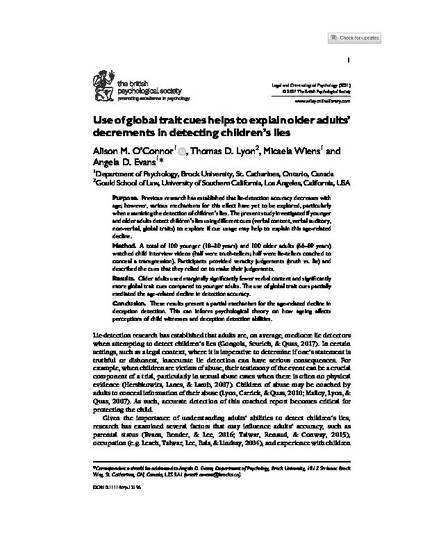
Article
88. Use of global trait cues helps to explain older adults’ decrements in detecting children’s lies. Legal and Criminological Psychology, 27(1), 48-62.
Legal and Criminological Psychology (Published 2022)
(2021)
Abstract
Purpose: Previous research has established that lie-detection accuracy decreases with age; however, various mechanisms for this effect have yet to be explored, particularly when examining the detection of children’s lies. The present study investigated if younger and older adults detect children’s lies using different cues (verbal-content, verbal-auditory, non-verbal, global traits) to explore if cue usage may help to explain this age-related decline. Method: A total of 100 younger (18-30 years) and 100 older adults (66-89 years) watched child interview videos (half were truth-tellers; half were lie-tellers coached to conceal a transgression). Participants provided veracity judgments (truth vs. lie) and described the cues that they relied on to make their judgments. Results: Older adults used marginally significantly fewer verbal-content and significantly more global trait cues compared to younger adults. The use of global trait cues partially mediated the age-related decline in detection accuracy. Conclusion: These results present a partial mechanism for the age-related decline in deception detection. This can inform psychological theory on how aging affects perceptions of child witnesses and deception detection abilities.
Keywords
- global trait cues,
- children's lies,
- child abuse,
- child sexual abuse,
- child witness,
- child neglect,
- child forensic interviewing
Disciplines
Publication Date
Summer July 2, 2021
Citation Information
O'Connor, A.M., Lyon, T.D., Wiens, M., & Evans, A.D. (2022). Use of global trait cues helps to explain older adults’ decrements in detecting children’s lies. Legal and Criminological Psychology, 27(1), 48-62.
